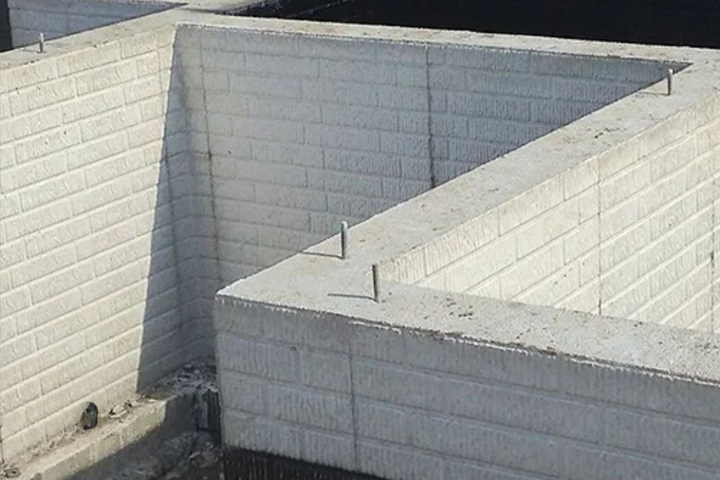Poured Wall Services:
- Poured Walls
- Block Walls
Poured Concrete Wall Foundations
Poured concrete wall foundations are a popular option in construction for their strength, durability, and adaptability. The process involves pouring liquid concrete into molds that form the walls, which are then allowed to cure and harden. This creates a solid, seamless wall that provides excellent resistance to water penetration, making it particularly well-suited for basements, retaining walls, larger residential or commercial projects and other below-ground structures. Moreover, these walls can be reinforced with steel rebar to increase their load-bearing capacity, making them ideal for supporting heavy structures.
While poured concrete walls and block wall foundations are both widely used in foundation construction, they differ significantly in materials, construction methods, and overall performance. Traditional block foundations are a solid option for residential homes or smaller projects such as basements and garages, however, there are several advantages to poured concrete foundations. When it comes to choosing what type of concrete foundation is best for your project, consider the following:
Materials and Construction Methods
Poured Walls
Poured concrete walls are created by pouring concrete into molds, which shape the wall as the material cures. This process involves a single, continuous pour that produces a solid, monolithic wall, often reinforced with steel rebar for added strength.
Block Walls
Constructed from individual concrete blocks, these walls are built by laying the blocks in a staggered pattern and securing them with mortar. Reinforcement is often added by filling the block cores with concrete and inserting rebar for additional strength.
Strength and Durability
Poured Walls
Typically, stronger and more durable due to their solid, continuous structure. This design offers superior resistance to lateral pressures, such as those from soil and water, and is less susceptible to cracking since there are no joints like in block walls.
Block Walls
Although block walls are strong, their numerous joints can become potential weak points. This makes them more prone to cracking and shifting over time, particularly under high pressure or in regions with freeze-thaw cycles.
Water Resistance
Poured Walls
They provide excellent water resistance due to their continuous structure without joints. This makes them less likely to develop leaks over time compared to block walls.
Block Walls:
They are more susceptible to water infiltration because of the mortar joints between blocks. As a result, additional waterproofing measures are often required.
Insulation and Energy Efficiency
Poured Walls
They generally offer better insulation and energy efficiency, especially when insulated concrete forms (ICFs) are utilized. This construction method also creates a tighter seal against air and moisture infiltration.
Block Walls
Typically offer less insulation due to gaps between the blocks allowing more air leakage. Additional insulation may be required to meet energy efficiency standards.
Construction Time and Labor
Poured Walls
Construction is typically faster once the forms are set, and the concrete is poured. It requires fewer labor hours than block walls, though the setup for pouring can be more involved.
Block Walls
More labor intensive and slower to build due to the need to lay each block individually. However, block walls may be easier to construct on smaller projects.
When considering which concrete foundation is the best fit for your project, consider poured concrete walls are generally stronger, more durable, and offer better water resistance and energy efficiency compared to block walls. However, they can be more costly upfront and require specialized labor. Block walls may be more affordable and easier to construct in certain situations, but they can require more labor and maintenance costs over time. At Stoltzfus & Sons, we can discuss your project and recommend what type of concrete foundation is best, not just for the immediate future, but for years to come.

